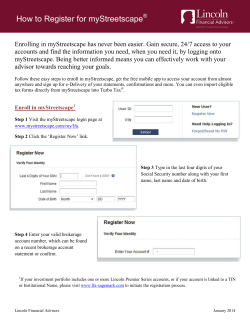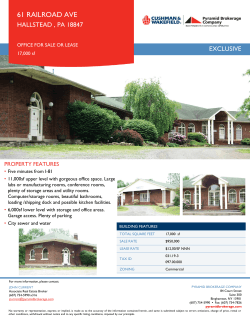
Forex Brokerage Success Made Easy.
Forex Brokerage Success Made Easy. A Quick Guide Contact us sales@leverate.com www.leverate.com Disclaimer. The information in this document is subject to change without notice. Leverate makes no representations or warranties with respect to the contents hereof and specifically disclaim any implied warranties of merchantability or fitness for any particular purpose. Leverate reserves the right to revise this publication and to make changes from time to time in the content hereof without obligation of Leverate to notify any person of such revision or changes. © Copyright, 2014 Leverate Technological Trading Ltd. Table of Contents Introduction...........................................................................1 How the Forex Market works.............................................2 Technology.............................................................................2 What does a brokerage need?...........................................4 Capital Requirements..........................................................5 Startup Risks.........................................................................6 Schedule for Opening a Brokerage...................................8 Incorporation and Licensing................................................................8 Registration ............................................................................................8 Features brokers should look for....................................10 The Forex Sales Cycle.........................................................................10 Finding and Retaining Clients............................................................10 Contact us sales@leverate.com www.leverate.com Disclaimer. The information in this document is subject to change without notice. Leverate makes no representations or warranties with respect to the contents hereof and specifically disclaim any implied warranties of merchantability or fitness for any particular purpose. Leverate reserves the right to revise this publication and to make changes from time to time in the content hereof without obligation of Leverate to notify any person of such revision or changes. © Copyright, 2014 Leverate Technological Trading Ltd. Introduction The following guide provides a roadmap for those interested in opening their own Forex brokerage. We will briefly cover the following: The Forex industry and its regulatory environment Required steps to begin marketing to traders Best practices for running a successful Forex business P1 How the Forex Market works Traders participate in the Forex market in order to take advantage of value fluctuations between currency pairs. Since the Forex market does not have a centralized clearinghouse, national banks and other huge financial institutions determine relative prices for currencies. The volumes of these interbank transactions result in the lowest level of spread, which is the difference in pips between the bid price and ask price of a given currency pair. Prime brokers are capital firms which place orders with the larger banks at a slightly increased spread. Prime brokers aggregate trades from smaller Brokerage firms to place higher volume trades. Brokers work directly with traders, either by passing their orders on to Prime Brokers with a small markup, or by trading as market makers themselves. Technology The success of your brokerage rests on providing clients with an engaging trading platform, limiting losses due to market movement or fraud through a robust risk management platform, accessing accurate prices quickly with an effective price feed, and tracking client interactions via a powerful CRM. How do each of these things work together, and what should you look for when outfitting your brokerage? When choosing between trading platforms, review the type of traders you will be soliciting. Some experienced traders may have already developed a strong preference for a particular platform, or may rely heavily upon automatic trading systems which require MT4 to function properly. Other traders prefer to work with a platform that allows for easy mobile trading. And some traders want the flexibility to choose from among different platforms. P2 There are three primary ways for brokers to gain access to a trading platform. The option with the highest upfront cost is to purchase a platform. However, when the cost is amortized over the course of several years, your total expenditure is less when you own a platform instead of leasing. Additionally, you have more control over which features will be included. With White Label platforms, you merely attach your brand to a preexisting platform template. The initial cost and ongoing maintenance fees are lower than with a purchase or lease arrangement, but there is usually little to no flexibility in terms of customization. This platform model also locks you into sending all of your trade flow through whomever your platform provider selects, which may result in higher spreads and/or lower net profits. Leasing a platform is also a possible option, allowing greater levels of customization than White Label platforms while avoiding the capital expense related to a platform purchase. Despite the lower upfront costs, the higher monthly maintenance fees mean that after approximately one year, you will have paid more than if you had bought your own platform. P3 What does a brokerage need to get started? Front-end Platform Back-end Liquidity An accurate Risk Management – Your interface that traders use to and ultra-low latency price feed Risk Management platform serves as place orders with the market. is critical to profiting from trades, a computerized dealing desk, setting Advanced platforms will include whether functioning as an A-Book parameters for multiple trader pro- an option for social trading , or B-Book broker. files. – The front end Price Feed – which give access to the trading histories of the members the trading community. CRM – The CRM system is a Counterparty – matches Prime Broker – A bank which record of all the contact your bro- up trade orders with someone provides a credit line for your brokerage kerage has with your leads and willing to take the other side (ECN) and determines the amount of leverage traders. A well-designed system or functions as a market maker by that will be available. A prime broker also will help optimize recruitment taking the other side of the trade gives a brokerage access to liquidity. campaigns and can be used to themselves. automate deposit notifications based on client trading histories. P4 Capital Requirements Plan to have significant funds set aside to cover ongoing costs during your brokerage’s first days of operation. In some locales, a minimum capital requirement has been already been codified for Forex businesses who are either based locally, or who are actively seeking clients living in the jurisdiction. These costs should be taken into consideration as one of the factors determining where to locate your brokerage. Your funds will need to be separated into operating expenses and trading expenses. Operating expenses are held aside for paying employees, utilities, and supplies, etc. Funds used to conduct trading need to be separated (the industry term is segregation) and funds received from clients should not be mixed with the general pool of funds. Given the large amounts of capital that a Forex brokerage will need to access, it is advisable to pursue a line of credit with a bank. Most major banks have experience working with Forex brokers, and you can investigate several different banks to determine which will offer the best combination of service and pricing. P5 Startup Risks All new businesses face some level of risk, and the Forex industry is no exception. There are risks inherent in starting a brokerage that are unavoidable, particularly those due to currency volatility. However, several common risks can be mitigated, and others can be avoided with proper planning. Regulatory Complications Technology Failures Operating Cost Incorporation Market Risk P6 Regulatory Complications: Compliance with regulations in a constantly evolving environment. Hire competent legal advisors, and place a premium on on individuals with financial services experience . Be careful to follow all regulations pertinent to the jurisdictions in which you are active. Vet traders thoroughly to avoid problems with money laundering and identity theft. Technology Failures: Software that crashes or hangs. Choose platforms with sufficient capacity for large numbers of simultaneous users. Confirm technology provider has redundant systems in case of component failure. Operating cost: Insufficient funds to manage day to day operations. Set aside enough operating capital to allow your Forex brokerage a cushion of several months. Incorporation: Choosing the best area to establish your business. Conduct research to narrow down which countries will be your first target markets. Market risk: Caused by unexpected market movements. Stay aware of news events. Hedge appropriately. P7 Typical Schedule for Opening a Brokerage Licensing and Registration After incorporating your company, becoming a licensed and registered Forex broker is the next step towards opening your own Forex business. Several locations cater to newly incorporated Forex brokerages, including Cyprus, Belize, British Virgin Islands, Cayman Islands, Jersey, Luxembourg, and Panama. Other jurisdictions, such as the U.K. and Switzerland have adopted complicated setup procedures and/or banking license requirements which place doing business in these countries out of the reach of most new Forex brokerages. Cyprus, Belize, and the Cayman Islands offer an excellent balance of affordability and respectability, while keeping required documentation at a manageable level. Cyprus gets extra credit, since Forex brokerages registered there gain access to clients residing in any of the countries belonging to the EU. Being registered can lead to an increased number of clients, since it indicates that you are putting forth a good faith effort to safeguard deposited funds. Licensing and registration requirements are determined by the specific country in which you will be actively seeking traders. We recommend researching your prospective client base so as to reduce the number of places in which you will need to register. Depending on where you decide to register, some jurisdictions, such as Bahrain, also have citizenship requirements. P8 1st Month Do your homework • Initial research to narrow down the target market • Collect initial operating capital • Complete the incorporation and registration process • Open account with bank and Payment Service Provider Get started • Evaluate and purchase trading platform 2nd Month • Begin marketing research • Platform setup • Find liquidity provider • Choose “A” Book, “B” Book, or hybrid strategy • Set up office (electric, internet, phones, etc.) • Create website • Hire staff • Design administrative system 3rd Month Training camp • Platform testing • Training employees • Begin initial marketing campaigns • Test trading with a small number of live clients Show time! • Proceed with full-scale marketing campaigns 4th Month and client acquisition • Assess the development of your lead gathering, conversion, and retention efforts • Monitor profitability • Look for growth opportunities • Evaluate product mix P9 What features should brokers look for? Secure and Reliable Technology – A Forex brokerage must track and safely store client information, transaction records, and trading funds, all while maintaining a constant connection to the market. When speaking to potential technology providers, verify that they offer a robust infrastructure for safeguarding personal details in case of attack or system failure, and that their system provides enough redundancy to eliminate trading stoppages caused by technical issues. Currently, the ISAE II certification denotes that the solutions provider meets the same high data and connection standards that have been established by the banking industry. Customer Support – Does the solutions provider offer 24 hour assistance by experts who understand the technical aspects of running a brokerage, as well as the ins and outs of the Forex industry? Is there a dedicated staff member available to answer questions about your account? The Forex Sales Cycle Many new brokerages face difficulties due to a lack of understanding of how much needs to be set aside for initial expenditures while finding the first group of traders. Choosing professionals who are aware of ways to limit cash burn can stretch your nest egg during the first few months. Revenue forecasting – The number of clients that you will acquire and retain during the course of a year, and the average amount that each client will deposit can be estimated based on trends in the region you select as your base, and the type of client that you will be recruiting. Less sophisticated traders typically have a higher attrition rate, and care must be taken to continually renew the client pool to bring in new deposits. When preparing a budget take into account cost estimates for fees due to technology providers, prime brokers, counterparties, marketing campaigns, and capital expenses associated with the upkeep of your physical location. Finding and Retaining Clients The lifeblood of a profitable brokerage is client acquisition and retention. Effective marketing campaigns focus on reaching those traders within your selected area who are most likely to act immediately, and will distinguish your brokerage from the competition. P 10 Hire expert sales professionals who have experience in the financial services or gaming industry, and who understand the trader mindset prevalent in your region. Lead conversion can be improved by offering competitive spreads, extending high leverage, and through the use of special promotions. Customer support presents another opportunity to position your brokerage as the best option. Keep the account opening process as streamlined as possible, and establish a reputation for transparency in terms of recording transactions and processing account requests. Staffing your support team with courteous and capable representatives will aid in customer retention. For more information regarding of how to start your own FX brokerage, please contact us at any time sales@leverate.com www.leverate.com We Make Trading Easy. P 11
© Copyright 2025











